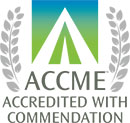Continuing Medical Education
Accreditation Statement

The American Association for Cancer Research (AACR) is accredited by the Accreditation Council for Continuing Medical Education (ACCME) to provide continuing medical education activities for physicians.
Credit Designation Statement
AACR has designated the AACR Annual Meeting 2022 live activity for a maximum of 412.75 AMA PRA Category 1 Credit(s)™. Physicians should only claim credit commensurate with the extent of their participation in the activity.
Credit certification for individual sessions may vary, dependent upon compliance with the ACCME Accreditation Criteria. The final number of credits may vary from the maximum number indicated above.
Claiming CME Credit
Credit Survey: All individuals requesting continuing medical education credits must complete a CME Request for Credit Survey by Wednesday, May 25, 2022. The Request for Credit Survey will be accessible by logging into the AACR Annual Meeting 2022 Program Planner and via email. Registrants log on using their registration number and last name.
General instructions for claiming CME/CE credit: If you built a “My Itinerary” schedule, from “My Itinerary” click on “Add all eligible Sessions to Credit Cart”.
If you did not build a “My Itinerary” schedule, add the sessions you attended by browsing sessions by day, by session category, or by session. Click the “Add to Cart” icon to the right of each CME eligible session. (Note: non -CME sessions will not have this “Add to Cart” option.)
Print CME Certificate: Print your CME Certificate by clicking “CME Certificates” on the menu at right.
ABIM MOC Statement

Successful completion of this CME activity, which includes participation in the evaluation component, enables the participant to earn up to 412.75 Medical Knowledge MOC points in the American Board of Internal Medicine’s (ABIM) Maintenance of Certification (MOC) program. Participants will earn MOC points equivalent to the amount of CME credits claimed for the activity. It is the CME activity provider’s responsibility to submit participant completion information to ACCME for the purpose of granting ABIM MOC credit.
To receive ABIM MOC, participants must complete all questions in the CME Request for Credit Survey and claim CME credit hours. Please then select “Request MOC Points Here” on the bottom right side of the screen. Once these steps are completed, AACR will submit your completion information via the ACCME’s Program and Activity Reporting System for the purpose of granting MOC points.
Statement of Educational Need, Target Audience, and Learning Objectives
The fight against cancer is rapidly progressing with the accelerating pace of discoveries in the basic, translational, and clinical sciences. This is due in large part to the advent of new technologies, such as advanced live imaging techniques and liquid biopsies, and our increased understanding of the importance of harnessing the power of the immune system to develop new immunotherapies. However, understanding and combating the processes of cancer initiation, progression, and response to treatment require a multidisciplinary approach. The AACR Annual Meeting brings together cancer biologists, clinical oncologists, and population scientists with engineers, computational biologists, and physical scientists to develop quantitative approaches and ask new questions to develop better strategies for curing cancer. By bridging the gap between what physicians understand about cancer biology and the clinical applications, this meeting aids basic researchers, physicians, and clinician-scientists in obtaining, synthesizing, and integrating the most current molecular-based tests to aid in the diagnosis, treatment, and prevention of cancer. Further, facilitating the interface between physicians and scientists increases the contributions of laboratory research to drug development as well as patient care, transforms the design and conduct of clinical research protocols, and creates an avenue for the rapid translation of laboratory research findings from “bench-to-bedside” for the benefit of improving patient outcomes. This meeting also acts as a forum to discuss cancer health disparities and help ensure that all patients benefit from emerging breakthroughs in research and cancer treatment.
Despite the tremendous progress in the field, cancer continues to be a global public health challenge, accounting for 1,670 deaths per day around the world. In the United States (U.S.) alone, it is predicted that 608,570 people will die from some form of cancer in 2021, making it the second most common cause of death after heart disease. One of the challenges we face is that cancer comprises more than 200 different diseases. For many of the most commonly diagnosed cancers in the U.S.—including lung, thyroid, bladder, ovarian, and colorectal cancer—incidence has been declining for more than a decade. However, incidence of other forms of cancer—including breast, renal pancreatic, endometrial, liver, and melanoma—has been on the rise. Incidence, diagnosis, access to treatment, and survival rates are also impacted by the cancer health disparities that exist in certain segments of the U.S. population, with older and underprivileged populations often witnessing higher incidences of cancer and mortality.
This conference will bring together investigators from the basic, translational, and clinical disciplines and provide them with a venue to discuss their recent advances, test new hypotheses, and establish new collaborations. To provide the most advanced technologies and treatments, it is critical to bridge the gap between physicians who are answering fundamental questions about cancer biology and clinicians who are applying the latest diagnostic and treatment advances to patient care. As the incidence of cancer continues to increase, the fields of cancer prevention and early interception offer unprecedented opportunities to decrease the worldwide burden of cancer.
After participating in this CME activity, physicians should be able to:
- Assess the technological advances and tools, such as liquid biopsies, being used to accelerate progress in cancer research and improve early detection and early interception, with the ultimate goal of extending patients’ lives and improving their quality of life.
- Articulate how advances in precision cancer medicine are leading to improved patient outcomes.
- Incorporate the latest research findings regarding therapies and treatment options, including immunotherapy and combination therapies, in a variety of cancer types to improve patient outcomes.
- Formulate new strategies integrating multidisciplinary scientific and clinical research efforts towards the prevention, early detection, and interception of cancer.
- Identify factors that impact the diagnosis, treatment, and prevention of various forms of cancers in patients from diverse populations.
- Develop collaborations among physicians, researchers, and clinician-scientists to advance approaches for cancer treatment and prevention.
Disclosure Statement
It is the policy of the AACR that the information presented at AACR CME activities will be unbiased and based on scientific evidence. To help participants make judgments about the presence of bias, with ineligible companies whose primary business is producing, marketing, selling, re-selling, or distributing healthcare products or services used by or on patients. All of the relevant financial relationships for these individuals have been mitigated. This disclosure information will be made available in the itinerary planner and on the website of this conference.
Acknowledgment of Financial or Other Support
The AACR gratefully acknowledges the following commercial supporters:
Professional Education Grants
AbbVie
Amgen
Astellas
AstraZeneca
Beigene
Daiichi-Sankyo
Bristol Myers Squibb
Exelixis Inc.
Genentech
Genmab
Gilead/Kite Pharma Inc.
GlaxoSmithKline
Incyte
Jazz Pharmaceuticals
Lilly
Novocure
Novartis
Pfizer
Taiho Oncology
Questions about CME?
Please contact the Office of CME at (215) 440-9300 or [email protected].
